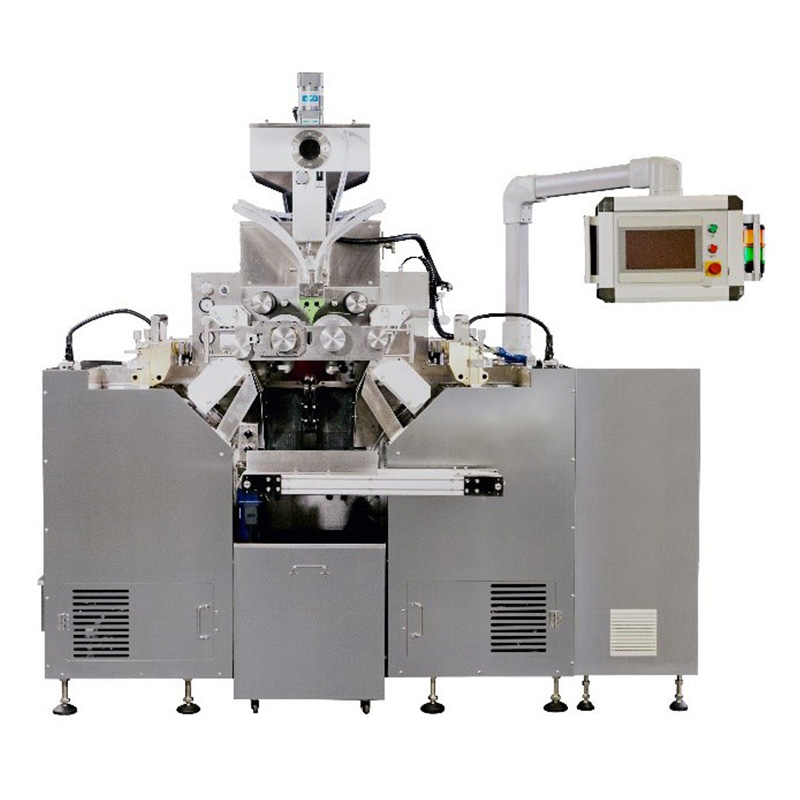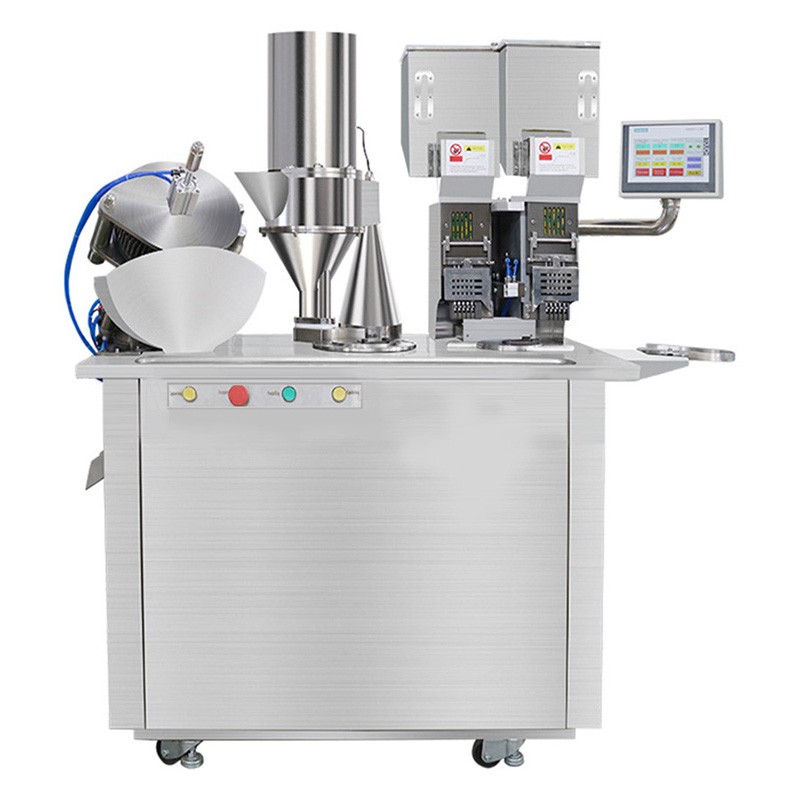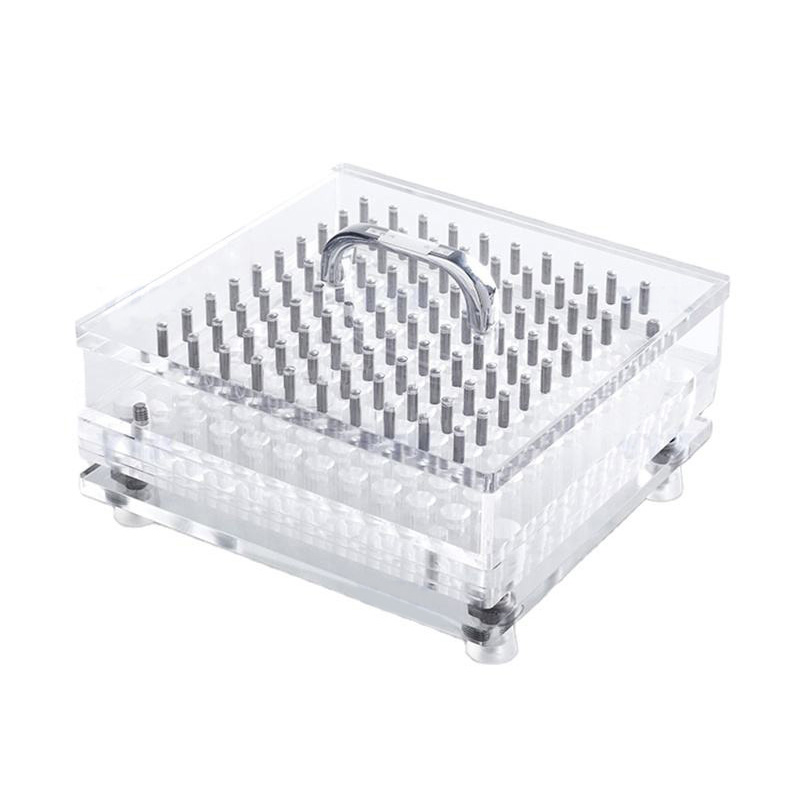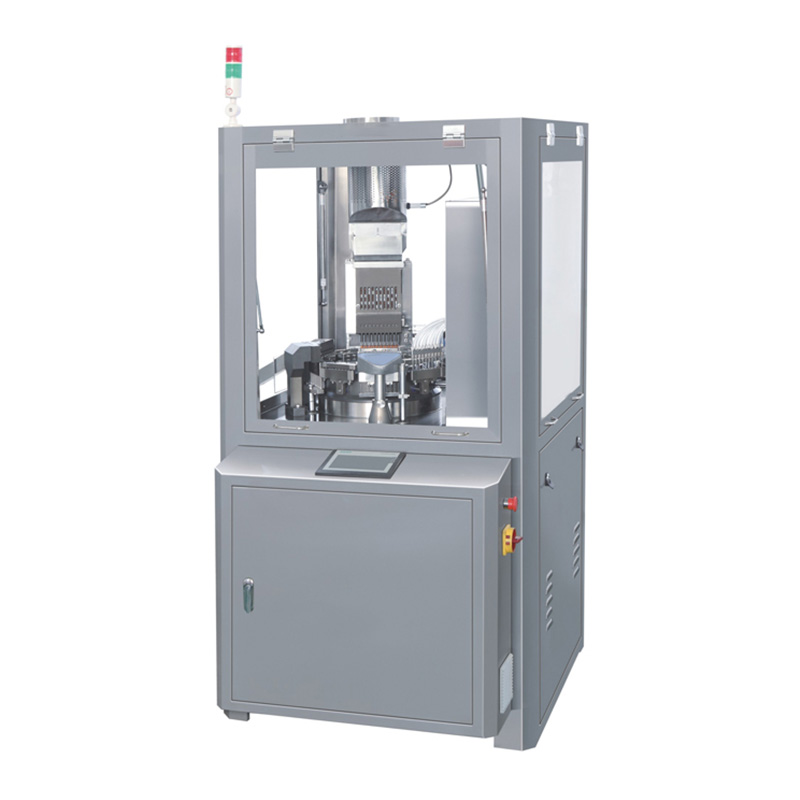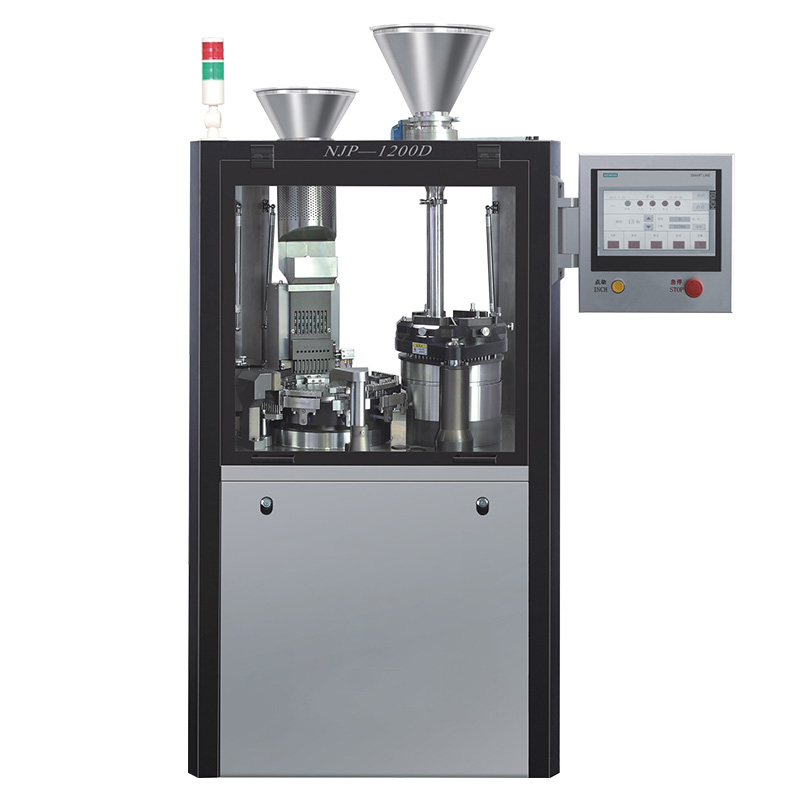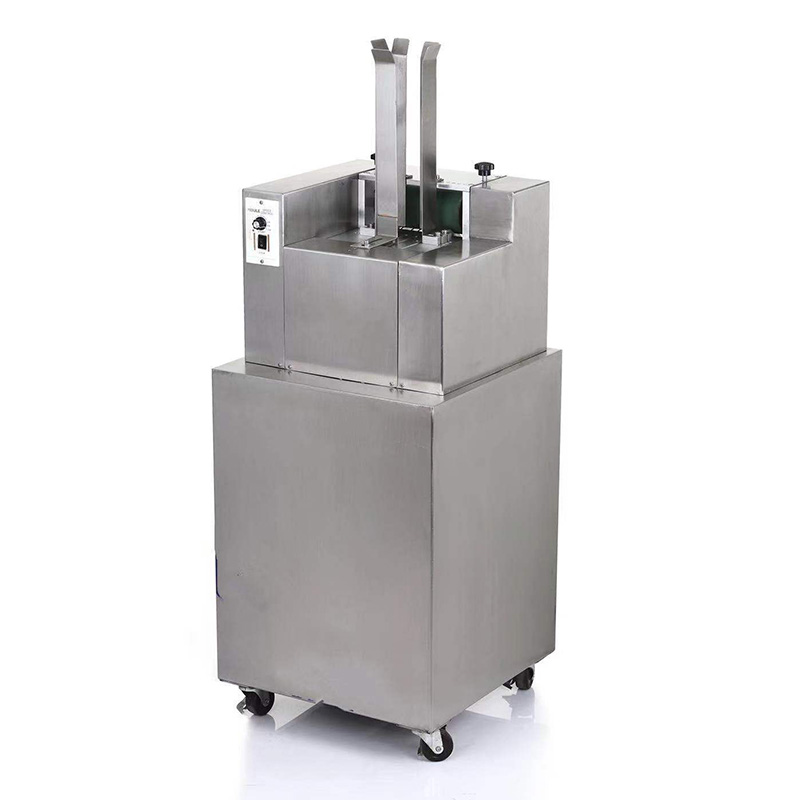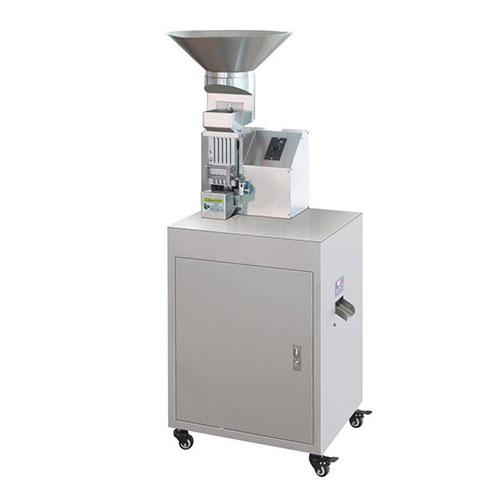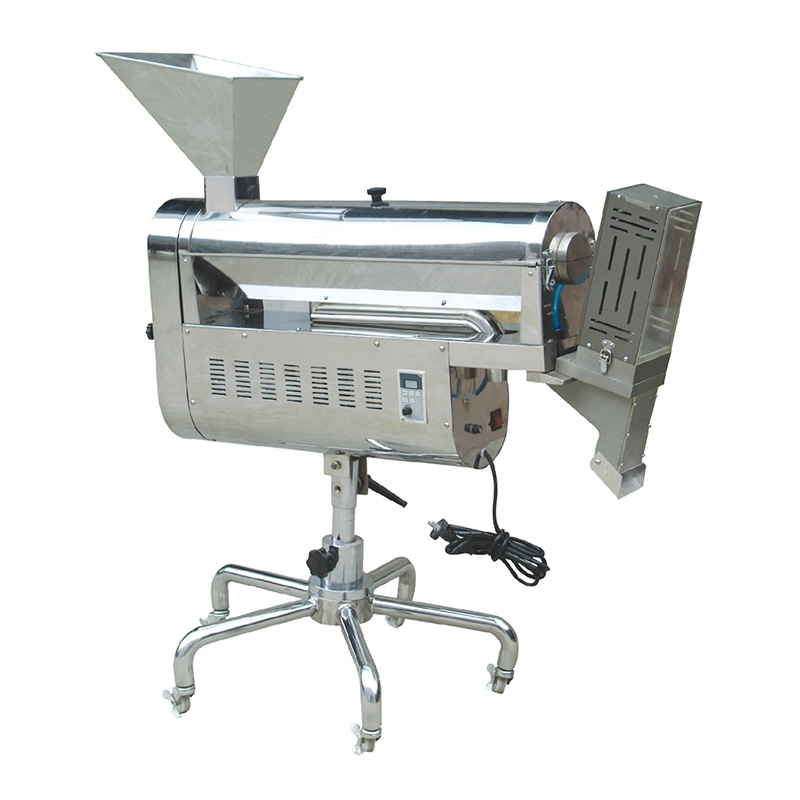Your Best Capsule Filling Machine Manufacturer
- Stable Performance
- High Precision Filling
- No Capsule No Filling Function
Capsule Filling Machine
If you’re looking for a machine to fill your own formulation into capsules to make your own capsules for supplement or nutrition,or you’re a pharmaceutical company ,you want to manufacture large scale of capsules with specific effect,capsule filling machine is a great option.But which type of capsule filling machine should you choose,what exactly the capsule filling machine working principle is and how will you benefit? We’re here to give you the lowdown on capsule filling machine and how many types of capsule filling machines are there and how to choose the most suitable one to fulfill your actual needs.
Capsule filling machine can be also called encapsulator,capsule filler or encapsulation machine,it is a mechanical device that commonly used for industrial and pharmaceutical purposes to fill empty soft or hard gelatin capsules of various sizes with powders,granules,semi-solids or liquid substance containing active pharmaceutical ingredients or a mixture of active drug substances and sxcipients.
The Buyer's Guide
Capsule Filling Machine: The Complete Buying Guide In 2025
Have you ever come across a capsule filling machine? Do you know how a capsule filling machine works and its importance to your business? You are at the right place! A capsule filling machine is an automated device used in the pharmaceutical and nutraceutical industries to fill empty capsules with powder. It is a simple, efficient and cost effective capsule filling system that helps in improving capsule production capacity as well as accuracy of capsule size and weight.

There are many different types of capsule filling machines on the market, each with its own unique features. Selecting the right machine for your needs can be a daunting task. In this blog post, we’ll discuss what to look for in a quality capsule filling machine and some of the benefits they can provide. Let’s dive in!
1.What Is A Capsule Filling Machine?
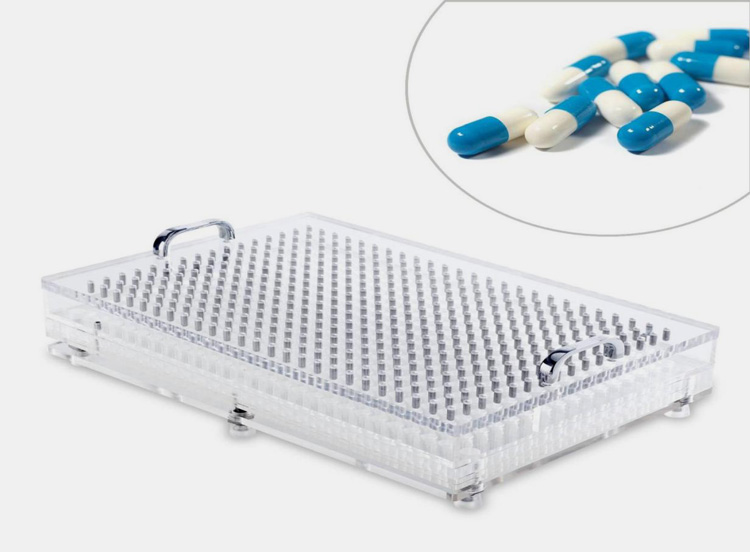
A capsule filling machine is a device used to fill empty capsule shells with powders, granules, and other small particles. The capsule filling machine has become an indispensable tool for the pharmaceutical industry, allowing capsules of various shapes and sizes to be filled quickly and accurately with precise dosages. Depending on the size and complexity of the product, capsule filling machines are available in manual, semi-automatic and fully automatic versions.
2.What Are The Components Of A Capsule Filling Machine?
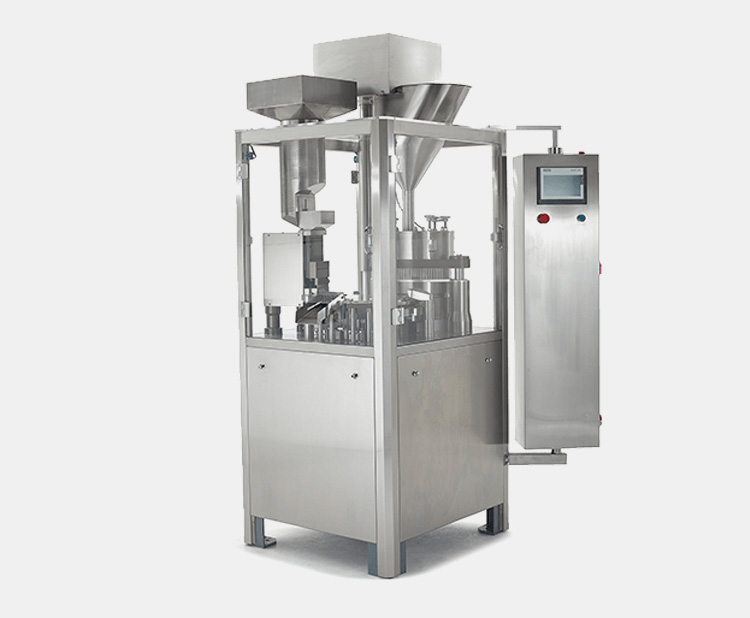
A capsule filling machine consists of several components that fill capsules with powders, pellets, or tablets. The components are:
Empty Capsule Hopper
The capsule hopper is a storage container that holds the empty capsules. It’s designed to move the tablet with gravity, feeding them into the capsule filling machine one at a time.
Rectifying Roller
The rectifying roller is used to properly align the capsule before it enters the capsule filling machine. It ensures that all of the capsules are in a uniform shape and prevents any cross-contamination of ingredients.
Magazine Plate
The magazine plate holds the capsule tamping pins and ensures that the tablets are properly filled with powder.
Powder Filling Hopper
The powder filling hopper is a container that holds the powdered ingredients. It’s designed to distribute the powder into the capsule evenly.
Cap Segmenting Disc
The capsule segmenting disc is used to separate the pill into two parts and ensure that each capsule is filled with the correct amount of powder.
Weight Control Unit
The weight control unit is used to ensure that each capsule contains the right amount of powder. It continuously monitors the capsule weight and adjusts the powder filling hopper accordingly.
Auger Motor
The auger motor is used to move the capsule along the capsule filling machine. It turns at a predetermined speed and is usually controlled by a computer.
Body Disc
The body disc is used to cap the capsule and ensure no powder is lost during the capsule filling process. It has a special coating that prevents capsule leakage.
Auxiliary Powder Hopper
The extra powder hopper stores any excess powder left after capsule filling. It helps minimize waste and allows for the reuse of the powder.
Control Station
The control station is the brain of the capsule filling machine. It controls all other components and ensures that each capsule is filled correctly.
3.What Are The Pros Of A Capsule Filling Machine?
The capsule filling machine offers a wide range of advantages, including:
Efficiency

Capsule filling machines are designed to quickly and accurately fill capsules with the desired ingredients, reducing time and labor costs.
Effectiveness
Capsule filling machines save money by eliminating the need for manual capsule filling and ensuring that the correct ingredients are used.
Quality
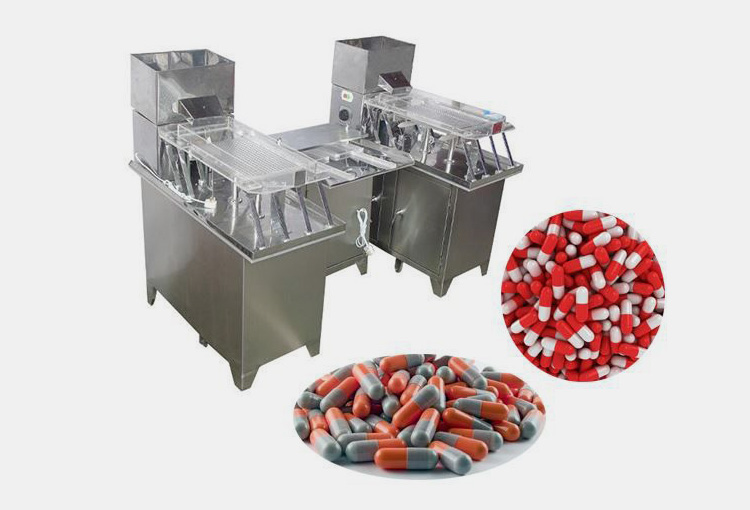
capsule filling machines produce capsules with consistent quality and size, ensuring that the capsule contents are uniform and accurate.
Safety
Capsule filling machines reduce potential risk factors associated with manual capsule handling and can be programmed to ensure accuracy in capsule doses.
Flexibility
Capsule filling machines can be easily customized to accommodate different capsule sizes and types.
Scalability
Capsule filling machines are designed to handle large batches of tablets, making it easy to scale production as needed.
Cleanliness
Capsule filling machines minimize the risk of contamination by keeping capsules and ingredients away from human contact.
Automation
Capsule filling machines can be programmed to run automatically, which minimizes errors and ensures accuracy in capsule amounts.
Versatility
Capsule filling machines can handle a wide range of capsule sizes and ingredients, allowing for greater flexibility in production.
Accuracy

Capsule filling machines offer precise measurements for each capsule, ensuring that capsule contents are accurate and consistent.
4.What Are The Cons Of A Capsule Filling Machine?
A capsule filling machine can increase your production, but it also has limitations. Some of these limitations include the following:
Cost

Capsule filling machines can be quite expensive compared to manual capsule-filling methods. Additionally, they require consumable materials such as capsules and filler material, which adds to the overall cost.
5.What Are The Applications Of A Capsule Filling Machine?
Capsule filling machines are used in many different industries. They include:
Pharmaceutical Industry
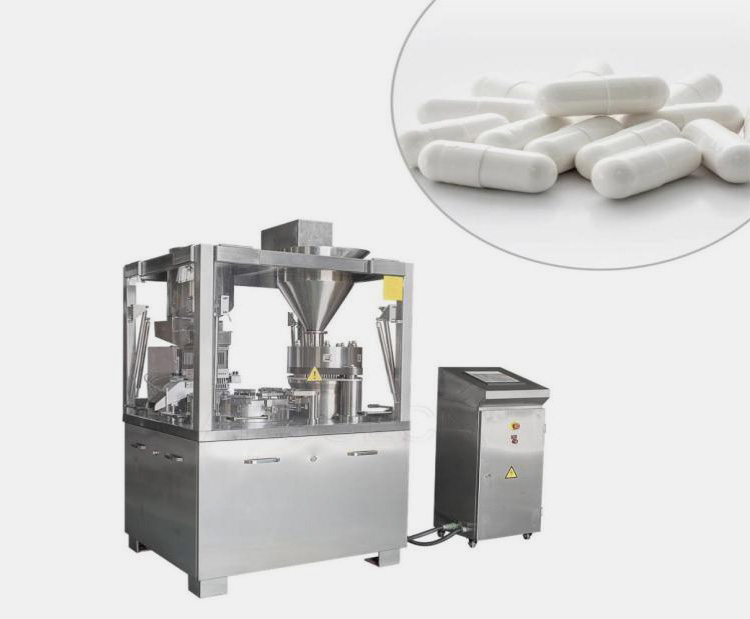
Capsule filling machines are commonly used in the pharmaceutical industry for producing tablets and capsules accurately and efficiently. This device is designed to fill a precise amount of active material into each capsule, ensuring that all products meet quality control standards.
Nutraceutical Industry

Capsule filling machines are also widely used in the nutraceutical industry. Nutraceutical capsule filling machines are used to fill dietary supplements such as vitamins, minerals, and herbal extracts into capsules.
Veterinary Industry

Capsule filling machines can be used in the veterinary industry for producing animal health supplements and other drugs in capsule form. The capsule filling machine can produce consistent products with precise amounts of active material, ensuring all products meet safety standards.
Food & Beverage Industry

Capsule filling machines are also used in the food and beverage industry for encapsulating ingredients such as probiotics, herbal extracts, and flavors into capsule form. The capsule filling machine is designed to provide precision dosing, ensuring consistent and accurate results every time.
6.How Does A Capsule Filling Machine Work?
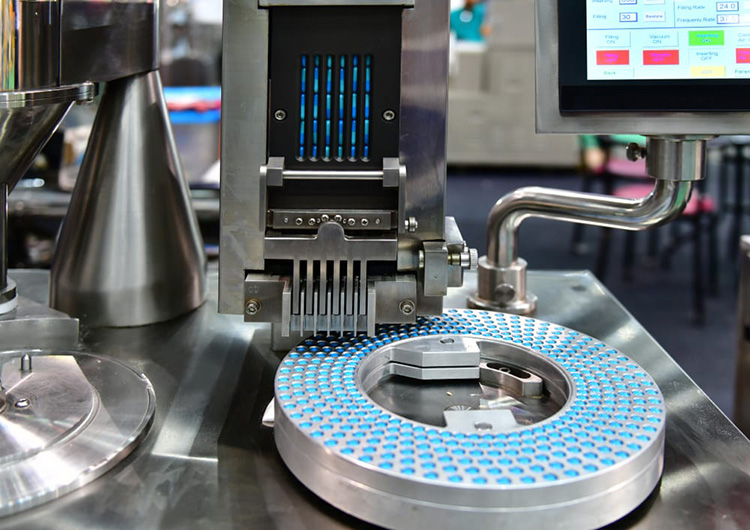
A capsule filling machine fills capsules with powder, granules, liquid, or semi-solids. It is typically powered by electricity and equipped with several mechanical parts such as capsule hoppers, capsule holders, rotary plates, dosage dispensers, etc.
The capsule hopper stores the empty capsules, and capsule holders hold them firmly in place. The capsule hopper drops the pills into the capsule holder, automatically aligned and ready for filling. The capsule holders have rotating plates along a track, pushing the capsule through various compartments as it is filled.
In the first compartment, a dosage dispenser measures a predetermined amount of powder or liquid according to the capsule size. It then proceeds to the sealing compartment, where heated plates seal off the capsule and compress the powder or drink inside. Finally, a capsule ejector pushes out the filled capsule from its holder.
7.What Are The Different Types Of Capsule Filling Machines Available On The Market?
Capsule filling machines come in various types, each with its advantages. They include:
Manual Capsule Filling Machines
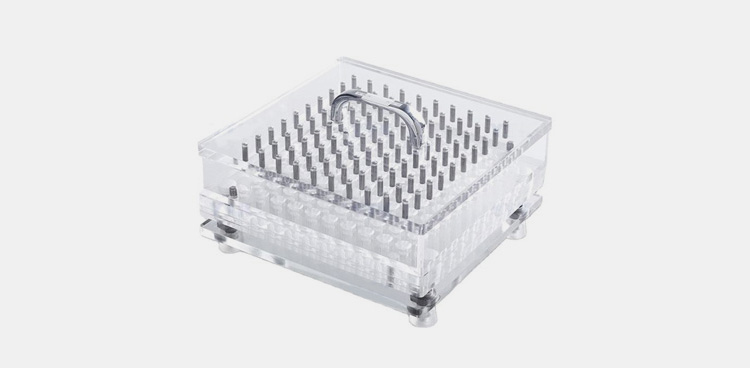
These are the most basic capsule filling machines, requiring manual labor to fill capsules with powders or granules. They are ideal for small batches as they are inexpensive and easy to use.
Components
Manual capsule filling machines are designed to be highly precise and efficient, making them ideal for use in pharmaceutical or healthcare settings. The main components of this type of machine include a hopper for holding the capsules, an elevator that moves the capsules into position, and a piston that pushes the substance into each capsule through an opening in the top.
Some manual capsule filling machines also include a vibrating tray to aid in the mixing of substances, as well as other specialized features depending on the application.
Working Principles
One of the main operating principles of manual capsule filling machines is precise control over dosing and fill volume. This is accomplished through the use of a dosing wheel, which controls the amount of material dispensed into each capsule and can be adjusted as needed to achieve a desired fill size.
The filling head is also carefully calibrated to ensure that the capsules are filled uniformly, with minimal spillage or leakage.
Applications
A manual capsule filling machine offers many benefits for those involved in the production and distribution of capsule-based products. Its applications include preparing pharmaceutical medications, dietary supplements, and nutritional powders.
In addition to simplifying the process of manual capsule filling, this type of machine can help reduce manual errors due to its precise mechanisms and advanced control systems.
b) Automatic Capsule Filling Machine
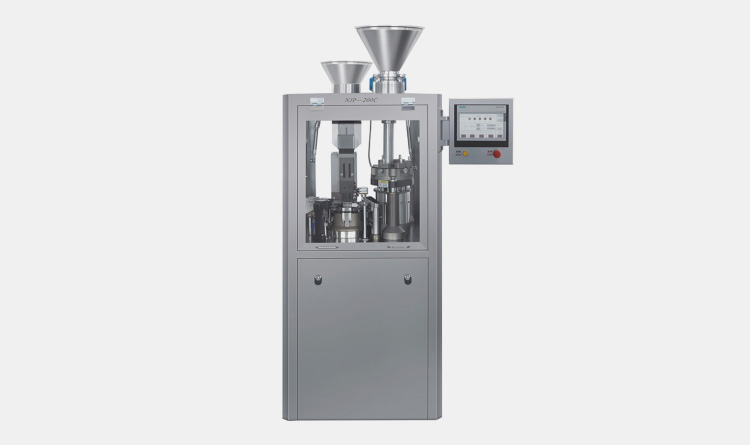
An automatic capsule filler can quickly fill large amounts of capsules at once. It uses a rotary system to encapsulate powder into pre-made capsule shells, so it’s much faster than manual options. The downside is that it requires more upfront investment than manual capsule filling machines.
Components
An automatic capsule filling machine is comprised of several different components, including a hopper to hold the capsules, conveyors to move capsules through the machine, and an assortment of mechanical rollers and blades that shape individual capsule shells.
Other key parts of an automatic capsule filling machine include sensors that monitor the flow of capsules and control switches to ensure safe and efficient operation, as well as a system to dispense fill material into the capsules.
Working Principles
The working principles behind an automatic capsule filling machine are fairly straightforward. All components within the machine are designed to move and operate in a consistent, controlled manner, allowing for the precise filling of capsules according to the desired specifications.
The automatic capsule capping mechanism ensures that each filled capsule remains securely sealed, preventing spillage or contamination during transport or storage.
Applications
Automatic capsule filling machines are an important tool for pharmaceutical manufacturers. Its main applications include increasing efficiency and accuracy in the manufacturing process, reducing labor costs associated with manual capsule filling, and improving product quality by helping to maintain consistent dosages and uniform capsule fill densities.
Additionally, automatic capsule filling machines can help to streamline production processes and reduce waste by eliminating the need for manual operations like hand-packing or hand-filling.
c)Semi-Automatic Capsule Filling Machine

This capsule filling machine is between manual capsule fillers and automatic capsule fillers. It is operated by hand, but it uses an automated system to help with the capsule filling process. This option is ideal for those who want an efficient capsule filler but don’t want to invest in a fully automatic machine.
Components
The components of a semi-automatic capsule filling machine typically include a hopper to hold the capsules, a dosing station for accurately placing the desired amount of powder or liquid into each capsule, and a conveyor belt or assembly line system to transport the filled capsules from one station to another.
Working Principals
The basic working principle of a semi-automatic capsule filling machine is based on the concept of compression and friction. As the encapsulation disk or wheel spins at high speeds, it applies pressure to the ingredients within the hopper, causing them to be compressed into small, uniform pellets that are then expelled through the collection platform.
Depending on the specific machine, these pellets may be filled into capsules by either manually filling each capsule or using a mechanical device that automatically ejects the filled capsules from the machine.
Applications
A semi-automatic capsule filling machine is a versatile tool that can be used in a variety of applications. These machines are commonly used in pharmaceutical and healthcare settings, where they provide a quick and easy way to fill capsules with the correct dosages of medications or other supplements.
Additionally, semi-automatic capsule filling machines can also be used in food manufacturing and other commercial settings, where they are commonly used to fill capsules with vitamins and other dietary supplements.
8.What Is The Difference Between Automatic and Semi-Automatic Capsule Filling Machine?
Automatic capsule filling machine
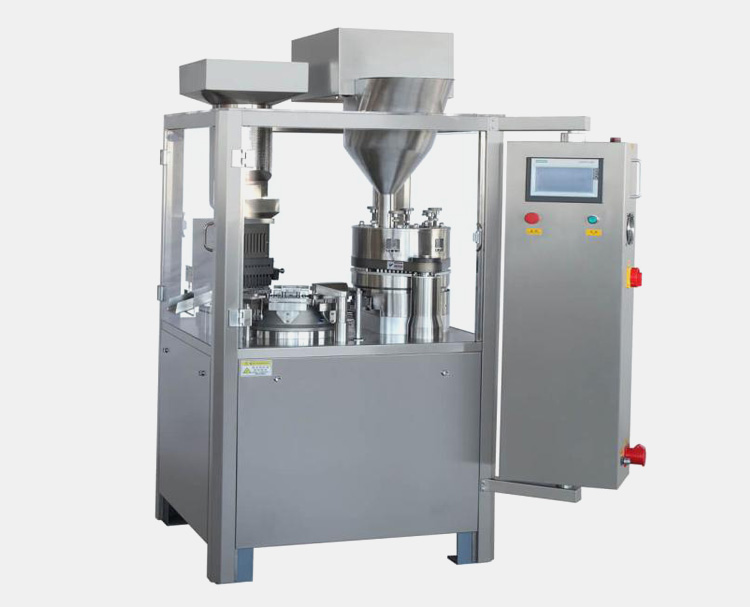
Semi-automatic capsule filling machine
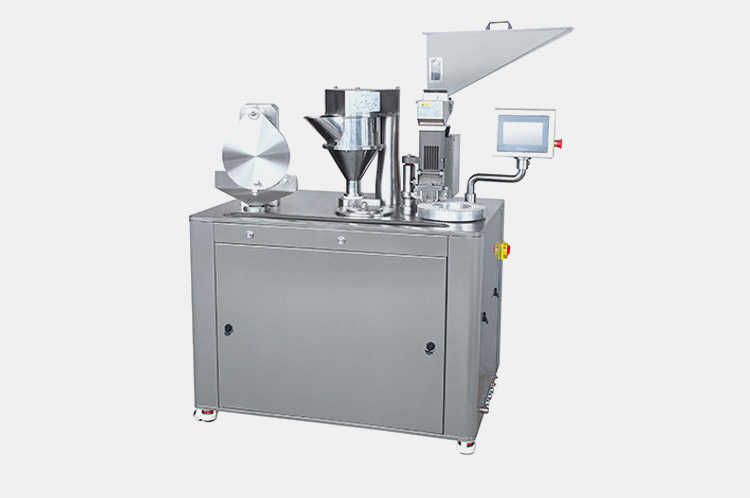
- Automatic capsule filling machines are programmed to fill capsule shells without requiring manual intervention. On contrary, a semi-automatic capsule filling machine may require some manual steps but can be operated with minimal supervision and does not require expertise or specialized knowledge.
- Automatic capsule machines are large in size with many components whereas semi-automatic capsule filling machines are small in size with few components.
- Automatic capsule filling machines operates at a much higher speed than a semi-automatic capsule filling machine.
- The cost of purchasing and maintaining an automatic capsule filling machine is much higher than that of a semi-automatic capsule filling machine.
- Automatic capsule filling machines generally provide faster production times than semi-automatic machines and can consistently produce higher quality capsules.
- Automatic capsule filling machines are ideal for large-scale production runs and offer greater speed, accuracy, and flexibility. On the other hand, semi-automatic capsule filling machines are more suitable for smaller-scale capsule production.
9.What Are The Different Types Of Capsules That Can Be Used With A Capsule Filling Machine?
Capsule filling machines are capable of filling a wide variety of capsule types. Here are some:
Gelatin Capsules
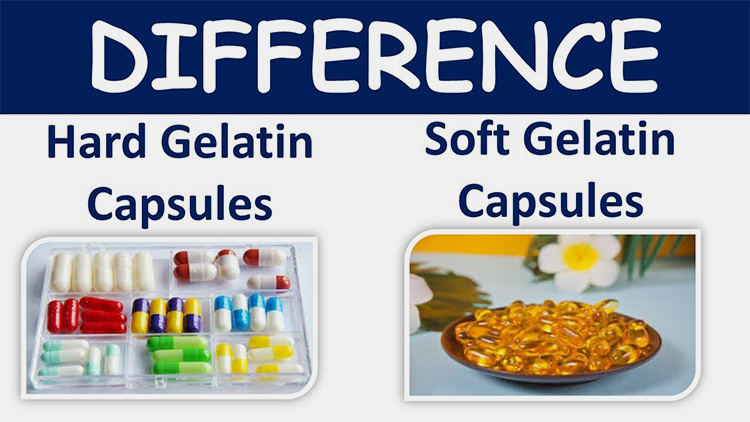
These are the most commonly used capsule type because of their quick dissolution time. They are made from animal sources and offer the most versatility regarding capsule size options.
Powder Capsules

Powder capsule is a tablet form filled with powder, which can be quickly digested by the body. This capsule type is often used in combination with other capsule types to provide additional benefits to the user.
Granule Capsule

Granule capsule is a capsule form filled with powder or granules, which are typically made up of small particles that can be quickly digested by the body. The capsule material is usually a combination of gelatin and vegetable cellulose to help ensure rapid dissolution in the body.
Vegetarian Capsules
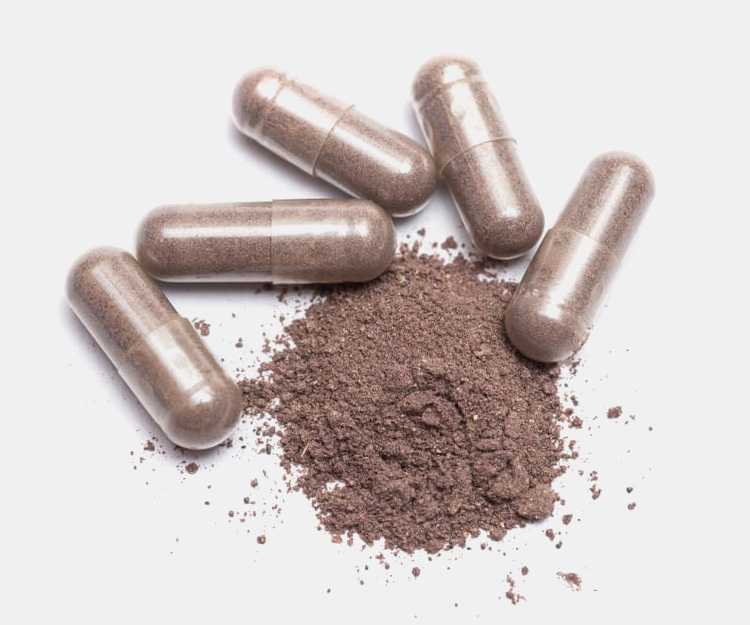
These type of capsules are made from vegetable cellulose and provide an alternative option for those looking for a tablet that is free of animal products.
Hard-Shell Capsules

usually contain plant-based ingredients such as hydroxypropyl methylcellulose (HPMC) or pullulan. They can be used to enclose active ingredients such as vitamins or supplements.
10.what safety measures should be taken while working with a capsule filling machine?
Wear protective gear

It is important to wear protective equipment such as gloves, eye protection, and a face mask when working with capsule filling machines to protect yourself from any potential hazards that could come from the capsule-filling process.
Keep the machine clean
Make sure the capsule-filling machine is always clean and free of dust or other debris. This will help ensure that the capsule filler is working properly and safely.
Monitor operation
It is important to constantly monitor the capsule-filling machine while it is in the process to identify any potential problems or issues before they become dangerous. This includes checking for abnormal sounds or vibrations that could indicate a problem with the capsule filler.
Unplug The Machine When Not in Use
When the capsule-filling machine is not in use, be sure to unplug it from the power source and store it safely away from any potential hazards. This will help ensure it isn’t damaged or put to unsafe use.
Use Only Authorized Personnel
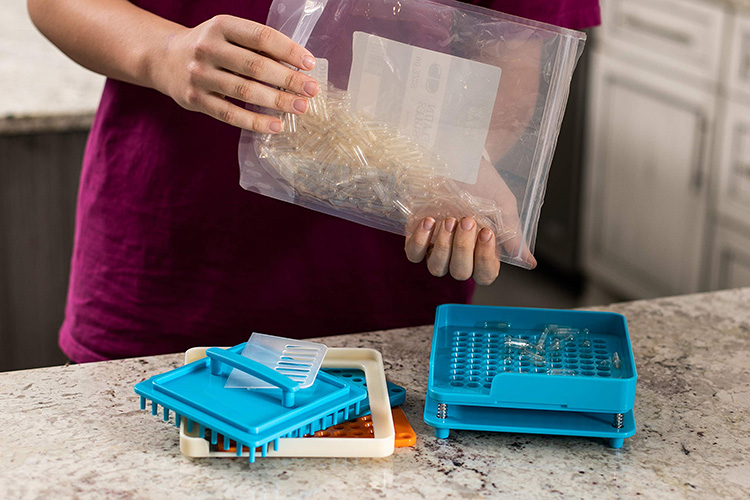
Only trained and qualified personnel should be allowed to use or maintain a capsule filling machine. This will help ensure that the capsule filler is used properly and safely.
11.What Are The Common Challenges Associated with Capsule Filling Machines And How The Can Be Overcome?
Low Speed
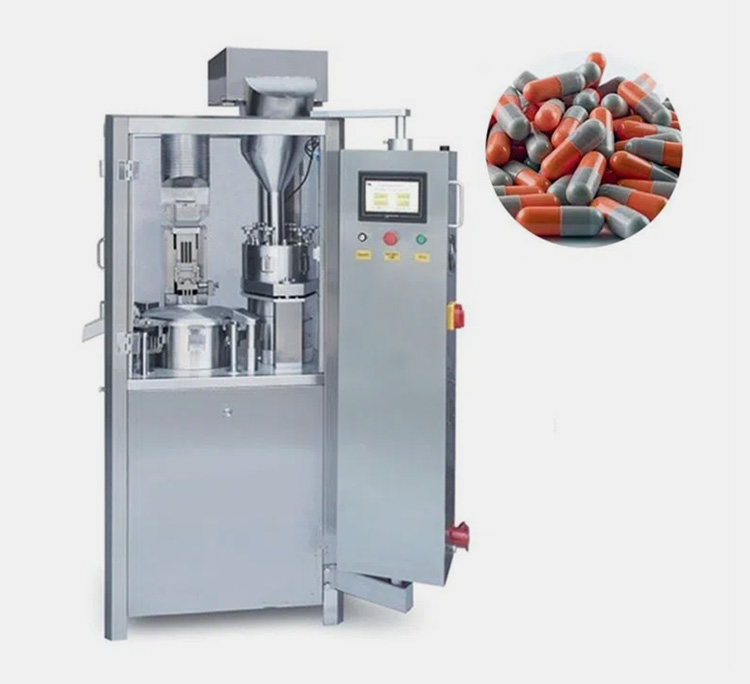
Capsule filling machines are typically not capable of rapidly meeting production demands. This is mainly due to their limited speed, accuracy and flexibility.
Solution
To overcome this challenge, operators should employ capsule filling machines that have higher speeds and improved accuracy while also utilizing efficient capsule management accessories like multi-lane filling systems or rapid sorting mechanisms.
Capsule Quality

Poor capsule quality can lead to an array of issues, from inadequate powder flow to incorrect capsule placement and capsule splitting.
Solution
To ensure capsule quality, a capsule inspection system should be implemented on the machine. This will detect any defective capsules before they reach the filling process and therefore prevent any capsule splits.
Powder Cross Contamination

Powder particles can sometimes stick to capsule surfaces, leading to cross contamination between batches or colors.
Solution
To prevent this from happening, capsule filling machines should be fitted with anti-contamination features such as static electricity management systems or air filtration units.
Costly Maintenance

Capsule filling machines require regular maintenance for optimal performance, which can lead to high operational costs.
solution
To reduce maintenance costs, capsule filling machines should be selected and maintained carefully.
Inaccurate Capsule Weight
Capsule weight can sometimes vary from batch to batch due to improper handling or measurements.
Solution
This issue can be overcome by selecting capsule filling machines that are equipped with automatic weighing sensors and weight adjustment functions for precise capsule filling results every time.
12.What Are The Maintenance Procedures For A Capsule Filling Machine?
Maintaining a capsule filling machine can be essential for ensuring its proper functioning. Below are some specific maintenance procedures to follow when dealing with capsule-filling equipment:
- Clean the capsule filler regularly and thoroughly. Ensure that all parts of the capsule filler are clean before starting any operation, as this will reduce contamination risk and extend the life span of the capsule filling machine.
- Assemble and reassemble components carefully according to instructions provided by your manufacturer or supplier. This will help ensure the correct settings and reduce potential issues due to misalignment or incorrect settings.
- Check seals on doors and other access points regularly to ensure they are completely closed during operation and not leaking air which could cause capsule integrity issues.
- Check for signs of wear and tear, especially on moving parts such as gearing and bearings. Proper lubrication should be applied to these parts to ensure smooth operation.
- Ensure all safety guards are present and functioning correctly. This includes any covers or shields attached to the capsule filler during operation.
- Inspect capsule fillers according to manufacturer guidelines before each use, and report any damage or faults immediately so they can be corrected quickly before production commences.
Following the above maintenance procedures will help ensure your capsule-filling machine operates efficiently and safely over a long time with minimal downtime due to repair or maintenance needs.
13.What Are The Key Considerations When Choosing A Capsule Filling Machine For Your Pharmaceutical Production Line?
Speed and Output
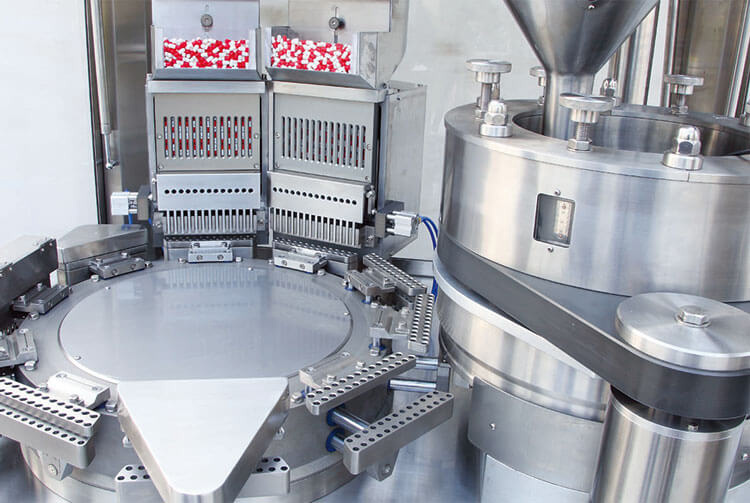
The capsule filling machine you choose should be able to fill the desired number of tablets at the speed required. Consider the capsule size, filling rate, and total output per hour to determine an appropriate capsule filling machine for your production line.
Cost

While price is typically a major consideration when selecting any equipment, it is important to remember that investing in higher quality machinery with more features could be more economical in the long run as it increases efficiency.
Accuracy

Accuracy is of utmost importance since incorrect capsule fill weights can impact product quality and safety and lead to costly recalls. Thus, capsule filling machines should have precise fill weight control and be equipped with weigh cell technology for accurate dosage dispensing.
Size and Volume
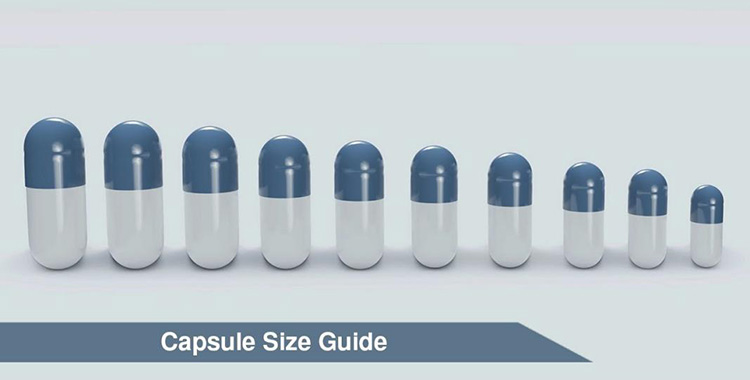
The capsule size and the volume of capsule filling are two factors that should be taken into consideration when selecting a capsule-filling machine. Smaller capsules require more precise technology, while larger capsule sizes allow for higher production speeds but may also require additional automation or manual operation depending on size and output needs.
Maintenance Requirements
Regular maintenance is required to ensure capsule filling machines continue functioning properly and should be considered when selecting the appropriate capsule-filling device for your production line. Consider things such as ease of cleaning, parts availability, and other maintenance requirements that may affect overall performance and costs.
Reliability
It is essential to select a capsule-filling machine that can provide reliable performance over long periods without interruption to prevent costly downtime or product loss. Choosing a capsule filling machine with proven reliability will help ensure consistent operation and cost savings in the long run.
Conclusion
Allpack companies filling machines are some of the most versatile in the market. With our different models and accessories, we can offer a complete solution for your product. Therefore, if you are looking for a high quality, durable, and affordable capsule filling machine, Allpack company is the way to go. Our team is here to answer any questions you may have about how our machines work or which model would be best suited for your needs.
CONTACT US
Tell us your raw material and project budget to get quotations within 24 hours.
WhatsApp:+86 18171018586
 Tell us your material or budget, we'll reply you ASAP within 24 hours
Tell us your material or budget, we'll reply you ASAP within 24 hours



